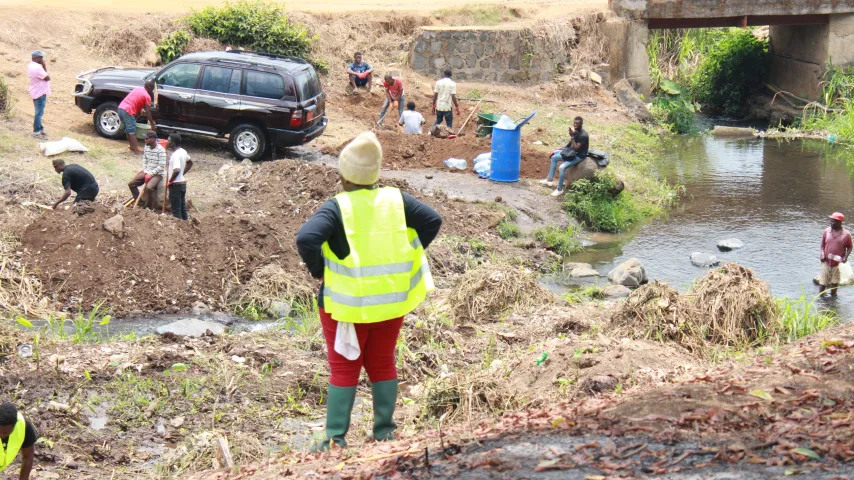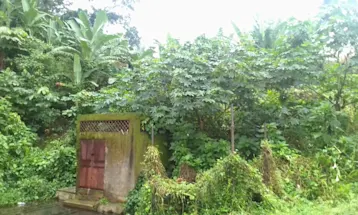Reclaiming our Natural Identity

Giacomo Delgado
Do we take care of nature or does nature take care of us? When Limbi Blessing Tata talks about the work she does with her organization, Ecological Balance, she leaves no room for doubt: it has to be both. Our identities are inextricably linked to the Earth. In order for ecosystem restoration to work, we will have to do more than just repair ecosystems, we also have to repair our relationship with the environment. Limbi is an excellent role model for doing so, speaking for those who don’t have voices and bringing mindfulness back to the way we treat the earth, and how it treats us.
Limbi’s past, present, and future are all deeply tied to the natural world. It was just a couple of generations ago that her grandfather moved from living primarily in forests to a life in a town in northern Cameroon. “It’s really not a town in the way you think,” she explains. “We depend on the forest for everything”. She talks to me about how deep this connection flows. Her community, still to this day, relies on the forest to provide for them. The forest gives them all the material provisions that allow for survival; medicine, food, water, security, and shelter. However, there’s something that stands apart from the rest, something that the forest provides that is just as important but not as quantifiable: identity. It echoes many of the conversations we’ve had at Restor. I remember Clara Rowe, Restor’s CEO saying “Our hope for Restor is that it changes everyone’s conception of how they interact with nature”. I think about how they’d get along, two leaders fighting for the same cause from thousands of kilometers away.

In a lot of ways, Limbi was raised by the forest and she is protective of it just as anyone would be of their family. “I would get into fights if somebody pulled out a flower for no reason”. I can’t help but laugh at an image of a young Limbi fighting people over flowers but in a lot of ways, Limbi is still doing exactly the same thing, fighting for those who cannot fight for themselves. At Restor, we’re committed to listening to what Limbi has to say and to providing her with all the tools she needs to be successful in her fight for those who need it most. This means fighting for nature, but also for women.
Limbi now leads her own organization and is seen as a leader in her community and across Cameroon, but it was not always this way. There’s a gritty determination in Limbi that has clearly grown out of years of fighting uphill. “On this side of the world women are supposed to be seen, we are not supposed to be heard,” she says recalling all the years when she was the only woman in the room. “If I had my way, I don’t want leadership, but if you don’t speak, no one else will speak. There’s too much at stake.” It’s remarkable to me how much overlap there is between her fight for women and her fight for nature. The motivation is so similar, the stakes are so high, and she feels a responsibility to fight for both these causes because she is both a woman and a part of the natural world.
It's precisely this relationship with nature, this bond, that inspired Limbi to start her own NGO. She was working for another prominent conservation NGO in Cameroon, but this organization was motivated by an ideology that many have realized is unsustainable. “Here I was in a circle that seemed to say ‘Conservation means thou shall not touch, leave the forest alone, don’t even go there,” but this is not healing the relationship between humans and nature, it is cutting it off.” Limbi was in a special position to navigate away from this ideology. As someone who grew up dependent on nature, really raised in it, she knew that people needed the forest, but also that the forest needed them. We can’t simply abandon the earth, we need to remember that we’re a part of nature not apart from it. On the other hand, we also can’t let our arrogance get the better of us, nature is not for us to use however we like, it’s part of who we are.
This realization led Limbi to start Ecological Balance, an organization with a more inclusive view of our relationship with nature. “We are balancing conservation with livelihoods,” says Limbi. “My background showed me that forests were all about livelihoods, and my work showed me that forests were all about conservation.” This intersection of realizations and philosophies is where Restor has learned so much from restorationists like Limbi. We’ve designed and built Restor not just for Limbi, but with Limbi, reflecting these important perspectives and the feedback of the people on the ground.
Today Ecological Balance focuses exclusively on community forests. They involve communities in the management and protection of forests at the foot of Mount Cameroon. Ecological Balance also goes one step beyond, working on social programs to provide marketable skills, hygienic products, and food donations to the communities that safeguard the forest. This way, Limbi empowers women and youths and conserves forests to protect life-giving resources like water. We need to take from the earth there is no way around it, so why wouldn’t we also give back? There cannot be one without the other, a relationship works in both directions.

Then, I ask Limbi about Restor. “I was excited out of my mind when I got the invite from Restor,” she says without hesitation. “To me, Restor is the next big thing.” She explaines how powerful it is to see a forest from above, to be able to access the satellite time series in Restor and watch how the forest has been degraded over time. From Limbi’s point of view, Restor helps to put that relationship with nature into perspective, to show communities that they’re all connected and dependent on a resource that is vanishing. She talks about the first time she saw one of her community forests from above: when she “zoomed in on that forest, I was shocked out of my skin at the level of destruction.” There’s power in visuals and she tells me that Restor will “help me give power back to the people, to the communities.” This is precisely what we’re hoping to achieve at Restor, empowering people on the ground, not just with data and technology, but with a new perspective on our relationship with nature.
It’s deeply moving to talk to Limbi, hearing her talk about her struggles to be heard as a woman and her fight to preserve the forests that ensured she could be here today. However, it is also deeply inspiring. Education, community, and forests were all part of her journey. They propelled her from a small town in Northern Cameroon to her journey through academia, earning an advanced degree from a prestigious University to starting Ecological Balance. We’re hopeful that with the support of people as passionate as Limbi, Restor can help restore not only ecosystems but also re-establish our identities.
Visit the restoration site featured in this story on Restor.